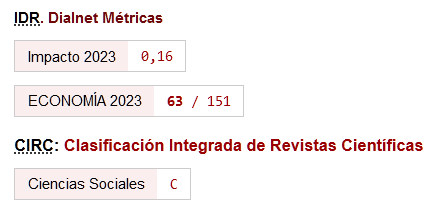Egalitarian Rules for Division Problems with Multiple References
DOI:
https://doi.org/10.46661/revmetodoscuanteconempresa.2350Keywords:
problemas de reparto, referencias múltiples, regla de igual pérdida, juegos cooperativos, division problems, multiple references, egalitarian allocation, cooperative gamesAbstract
We consider the division problems in which a resource must be distributed considering agents' references. We analize this problems in a multidimensional context, we consider that agents have multiple references. For division of the amount available in these situations, we design rules that take into account the multidimensionality of the references of each agent. We propose and we analyze different rules based on an egalitarian principle and provide a procedure for the selection of a single allocation.
Downloads
References
Aumann, R.J. y Maschler, M. (1985): Game theoretic analysis of a bankruptcy problem from the Talmud. Journal of Economic Theory, 36, 195-213.
Bergantiños, G.; Lorenzo, L. y Lorenzo-Freire, S. (2010): A characterization of the proportional rule in multi-issue allocation situations. Operations Research Letters, 38, 17–19.
Bergantiños, G.; Lorenzo, L. y Lorenzo-Freire, S. (2011): New characterizations of the constrained equal awards rule in multi-issue allocation situations. Mathematical Methods of Operations Research, 74, 311-325.
Calleja, P.; Borm, P. y Hendrickx, R. (2005): Multi-issue allocation situations. European Journal of Operational Research, 164, 730-747.
González-Alcón, C.; Borm, P.; Hendrickx, R. (2007): A composite run-to-the-bank rule for multi-issue allocation situations. Mathematical Methods of Operations Research, 65, 339-352.
Hinojosa, M.A.; Mármol, A.M. y Thomas, L.C. (2005): Core, least core and nucleolus for multiescenario cooperative games. European Journal of Operational Research, 164, 225-238.
Hinojosa, M.A.; Mármol, A.M. y Sánchez, F.J. (2012): A consistent Talmudic rule for division problems with multiple references. TOP, 20, 3, 661-678.
Hinojosa, M.A.; Mármol, A.M. y Sánchez, F.J. (2013):] Extended proportionality in division problems with multiple references. Annals of Operations Research, 206, 183-195.
Hinojosa, M.A.; Mármol, A.M. y Sánchez, F.J. (2014): Leximin rules for bankruptcy problems under uncertainty. International Journal of Systems Science, 45, 20-28.
Ju, B-G.; Miyagawa, E. y Sakai, T. (2007): Non-manipulable division rules in claim problems and generalizations. Journal of Economic Theory, 132, 1-26.
Lorenzo-Freire, S.; Casas-Méndez, B. y Hendrickx, R. (2010): The Two-stage Constrained Equal Awards and Losses Rules for Multi-issue Allocation Situations. TOP, 18, 465–480.
Moreno-Ternero, J.D. (2009): The proportional rule for multi-issue bankruptcy problems. Economics Bulletin, 29, 483-490.
Nishizaki, I. y Sakawa, M. (2001): On computational methods for solutions of multiobjective linear production programming games. European Journal of Operational Research, 129, 386-413.
O'Neill, B. (1982): A problem of rights arbitration from the Talmud. Mathematical Social Sciences, 2, 345-371.
Sánchez, F.J. (2012): An algorithm to compute a rule for division problems with multiple references. Revista Electrónica de Comunicaciones y Trabajos de ASEPUMA. Rect@, 13, 107-118.
Thomson, W. (2003): Axiomatic and game-theoretic analysis of bankruptcy and taxation problems: A survey. Mathematical Social Sciences, 45, 249-297.
Thomson, W. (2007): How to divide when there isn't enough. From the Talmud to game theory. Manuscript. University of Rochester.
Downloads
Published
How to Cite
Issue
Section
License
Copyright (c) 2016 Journal of Quantitative Methods for Economics and Business Administration

This work is licensed under a Creative Commons Attribution-ShareAlike 4.0 International License.
Submission of manuscripts implies that the work described has not been published before (except in the form of an abstract or as part of thesis), that it is not under consideration for publication elsewhere and that, in case of acceptance, the authors agree to automatic transfer of the copyright to the Journal for its publication and dissemination. Authors retain the authors' right to use and share the article according to a personal or instutional use or scholarly sharing purposes; in addition, they retain patent, trademark and other intellectual property rights (including research data).
All the articles are published in the Journal under the Creative Commons license CC-BY-SA (Attribution-ShareAlike). It is allowed a commercial use of the work (always including the author attribution) and other derivative works, which must be released under the same license as the original work.
Up to Volume 21, this Journal has been licensing the articles under the Creative Commons license CC-BY-SA 3.0 ES. Starting from Volume 22, the Creative Commons license CC-BY-SA 4.0 is used.










